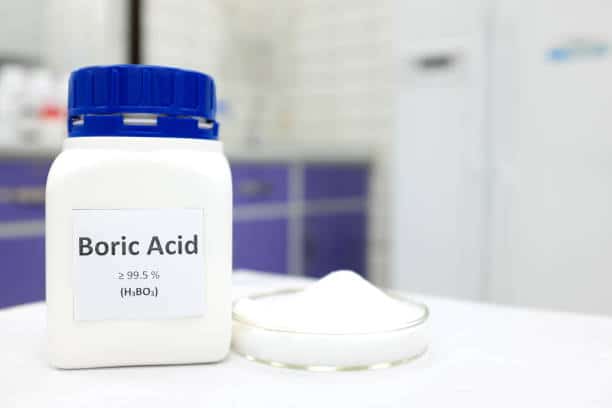Boric acid is a white, crystalline substance that has been used for various purposes, including as a pesticide and antiseptic. In recent years, it has gained popularity as a treatment for vaginal infections, particularly yeast infections and bacterial vaginosis.
However, some people have also started using boric acid suppositories as a form of contraception. Do Boric Acid Suppositories Kill Sperm? This has led to questions about whether or not they are effective at preventing pregnancy.
Boric acid suppositories are small capsules that are inserted into the vagina. They are typically used to treat vaginal infections, but some people have also started using them as a form of birth control.
The idea is that the boric acid will kill any sperm that enters the vagina, preventing fertilization from occurring. However, there is limited research on the effectiveness of boric acid suppositories as a contraceptive, and it is not a recommended method of birth control.

Key Takeaways
- Boric acid suppositories are commonly used to treat vaginal infections, but some people use them as a form of birth control.
- Limited research exists on the effectiveness of boric acid suppositories as a contraceptive, and it is not a recommended method of birth control.
- It is important to consult a healthcare professional before using boric acid suppositories for any purpose.
1. Understanding Boric Acid and Its Uses

Boric acid is a white, crystalline powder that is commonly used as an antiseptic and antifungal medicine. It is also known as hydrogen borate or boracic acid.
Boric acid can be found in many over-the-counter products, including suppositories, eye drops, and topical creams.
Boric acid is a weak acid that has antiseptic properties. It works by disrupting the cell membranes of bacteria and fungi, preventing them from growing and multiplying.
Boric acid is also effective against some types of viruses.
Boric acid is often used to treat vaginal yeast infections. It can be found in the form of suppositories that are inserted into the vagina.
Boric acid suppositories are believed to work by changing the pH of the vagina, making it less hospitable to yeast.
Although boric acid is generally considered safe when used as directed, it can be toxic if ingested in large amounts. It is important to follow the instructions on the product label and to use boric acid only as directed by a healthcare professional.
In summary, boric acid is a versatile antiseptic and antifungal medicine that is commonly used in over-the-counter products. It is effective against bacteria, fungi, and some viruses.
Boric acid suppositories are often used to treat vaginal yeast infections, but it is important to use them only as directed.
2. Boric Acid Suppositories: What You Need to Know

Boric acid suppositories are a type of vaginal suppository that contains boric acid. These suppositories are used to treat various vaginal infections, such as yeast infections and bacterial vaginosis.
However, there is some debate over whether or not boric acid suppositories can kill sperm.
Boric acid is a natural compound that is commonly used as an antiseptic and insecticide. It is also used in some medical treatments, including the treatment of vaginal infections.
Boric acid suppositories are typically available in capsule form and are inserted into the vagina using an applicator.
While boric acid is effective at treating vaginal infections, there is some concern that it may also kill sperm. However, the evidence on this is mixed.
Some studies have suggested that boric acid can reduce sperm motility, while others have found no effect.
It is important to note that boric acid suppositories are not a reliable form of birth control. If you are looking for a contraceptive method, you should speak with your healthcare provider about other options.
If you are using boric acid suppositories to treat a vaginal infection, it is important to follow the instructions provided by your healthcare provider or the product manufacturer. You should also be aware of any potential side effects, such as itching, burning, or irritation.
Overall, while there is some debate over whether or not boric acid suppositories can kill sperm, they are generally considered safe and effective for treating vaginal infections. However, if you have any concerns or questions about using boric acid suppositories, you should speak with your healthcare provider.
3. Boric Acid Suppositories and Yeast Infections

Boric acid suppositories are often used to treat yeast infections, particularly those that are recurrent or resistant to other treatments. Yeast infections, also known as candidiasis, are caused by an overgrowth of yeast in the vagina.
Symptoms may include vaginal itching, redness, and discharge.
Antifungal medications are typically used to treat yeast infections, but boric acid suppositories may also be effective. Boric acid works by altering the pH of the vagina, making it less hospitable to yeast.
It also has mild antiseptic properties that can help to reduce the number of yeast cells.
Boric acid suppositories are generally considered safe when used as directed. However, they should not be used during pregnancy or by people with kidney disease.
Some people may experience mild burning or irritation when using boric acid suppositories.
It’s important to note that boric acid suppositories are not a first-line treatment for yeast infections. They should only be used under the guidance of a healthcare provider.
In addition, people with recurrent yeast infections should be evaluated for underlying conditions that may be contributing to the problem, such as diabetes or a weakened immune system.
Overall, boric acid suppositories may be a useful alternative treatment for yeast infections, particularly in cases where other treatments have failed. However, it’s important to use them appropriately and under the guidance of a healthcare provider.
4. Boric Acid Suppositories and Bacterial Vaginosis

Bacterial vaginosis (BV) is a common vaginal infection caused by an overgrowth of harmful bacteria in the vagina. BV can cause a range of symptoms, including vaginal discharge, itching, and a fishy odor.
While there are several treatments available for BV, some women have turned to boric acid suppositories as a potential remedy.
Boric acid is a white, crystalline substance that has antibacterial properties. It works by disrupting the cell walls of microorganisms, which can lead to their death.
Boric acid suppositories are inserted into the vagina and are thought to help restore the natural balance of bacteria in the vagina.
While there is some evidence to suggest that boric acid suppositories may be effective in treating BV, it is important to note that they are not a first-line treatment. Women who are experiencing symptoms of BV should consult with a healthcare provider to determine the best course of treatment.
Additionally, it is important to use boric acid suppositories as directed and to be aware of potential side effects. Some women may experience burning or irritation after using boric acid suppositories, and they should discontinue use if these symptoms occur.
Overall, while boric acid suppositories may be a potential treatment option for BV, more research is needed to determine their effectiveness and safety. Women who are considering using boric acid suppositories should speak with a healthcare provider to determine if they are a suitable option for their individual needs.
5. Boric Acid Suppositories as a Contraceptive

Boric acid suppositories are commonly used for treating vaginal infections, but there is some speculation that they may also have contraceptive properties. However, there is limited research available on the effectiveness of boric acid suppositories as a contraceptive method.
Boric acid is a mild antiseptic that has been used for over a century as a treatment for various infections. It works by disrupting the pH balance in the vagina, creating an environment that is hostile to harmful bacteria.
This same mechanism of action has led some to believe that boric acid may also kill sperm and prevent pregnancy.
While there is some anecdotal evidence to support the use of boric acid suppositories as a contraceptive method, there is no scientific data to confirm its effectiveness. In fact, some studies have suggested that boric acid may actually increase the risk of pregnancy by altering the cervical mucus and making it easier for sperm to reach the egg.
It is important to note that boric acid is not approved by the FDA for use as a contraceptive, and should not be relied upon as a sole method of birth control. Women who are looking for an effective and reliable contraceptive method should consult with their healthcare provider to explore the various options available to them.
In conclusion, while boric acid suppositories may have some potential as a contraceptive method, there is not enough scientific evidence to support their use as a reliable form of birth control. Women who are concerned about preventing pregnancy should explore other options with their healthcare provider.
6. Boric Acid Suppositories and Sperm

Boric acid suppositories are commonly used to treat vaginal infections, such as yeast infections and bacterial vaginosis. However, some people have also suggested using boric acid suppositories as a form of birth control by killing sperm.
Boric acid is a weak acid that can disrupt the pH balance of the vagina, making it difficult for certain bacteria and fungi to survive. However, there is little evidence to suggest that boric acid suppositories are an effective form of birth control.
While boric acid may have some spermicidal properties, it is not a reliable or effective method of birth control. Sperm are able to survive in the vagina for several days, and boric acid may not be able to kill all of the sperm before they reach the cervix.
Additionally, boric acid can be toxic when ingested or absorbed through the skin, and can cause serious harm if used improperly. It is important to consult with a healthcare provider before using boric acid suppositories or any other form of birth control.
In summary, while boric acid suppositories may have some spermicidal properties, they are not a reliable or effective form of birth control. It is important to use proven methods of birth control, such as condoms or hormonal contraceptives, to prevent unintended pregnancy.
7. Potential Side Effects of Boric Acid Suppositories

While boric acid suppositories are generally considered safe, there are some potential side effects that users should be aware of. These side effects may include:
- Burning or irritation: Some users may experience a burning sensation or irritation after using boric acid suppositories. This is usually mild and goes away on its own, but if it persists or becomes severe, users should stop using the suppositories and consult with a healthcare provider.
- Skin rash or hives: In rare cases, users may develop a skin rash or hives after using boric acid suppositories. If this occurs, users should stop using the suppositories and seek medical attention.
- Vaginal irritation or discomfort: Some users may experience vaginal irritation or discomfort after using boric acid suppositories. This is usually mild and goes away on its own, but if it persists or becomes severe, users should stop using the suppositories and consult with a healthcare provider.
- Vaginal bleeding: In rare cases, users may experience vaginal bleeding after using boric acid suppositories. If this occurs, users should stop using the suppositories and seek medical attention.
- Allergic reactions: While rare, some users may have an allergic reaction to boric acid suppositories. Symptoms of an allergic reaction may include difficulty breathing, hives, or swelling of the face, lips, tongue, or throat. If this occurs, users should seek medical attention immediately.
It is important for users to follow the instructions provided with the suppositories and to talk to a healthcare provider if they have any concerns or experience any side effects.
8. Boric Acid Suppositories and Pregnancy

Boric acid suppositories are a popular remedy for treating vaginal infections, such as yeast infections and bacterial vaginosis. However, there is a lot of confusion and misinformation about the use of boric acid suppositories during pregnancy.
Some women may wonder if boric acid suppositories can affect their chances of getting pregnant or harm their developing fetus. While there is not a lot of research on the topic, the available evidence suggests that boric acid suppositories are safe to use during pregnancy when used as directed.
One study published in the Journal of Obstetrics and Gynaecology Canada found that there was no significant difference in pregnancy outcomes between women who used boric acid suppositories during pregnancy and those who did not. However, it is important to note that this study was small and further research is needed to confirm these findings.
It is always best to consult with a healthcare provider before using any medication or supplement during pregnancy. Women who are pregnant or trying to conceive should talk to their doctor about the safety and effectiveness of boric acid suppositories for their specific situation.
Overall, while there is limited research on the use of boric acid suppositories during pregnancy, the available evidence suggests that they are safe to use when used as directed and under the guidance of a healthcare provider.
9. Boric Acid Suppositories and Sexual Health

Boric acid suppositories are commonly used to treat vaginal infections such as yeast infections and bacterial vaginosis. However, there is little research on the effects of boric acid suppositories on sexual health.
Some people may wonder if boric acid suppositories can kill sperm and affect fertility. While boric acid has been shown to have spermicidal properties in some studies, more research is needed to determine its effectiveness as a form of contraception.
It is important to note that boric acid should not be used as a substitute for other forms of contraception, such as condoms, diaphragms, or hormonal birth control. Using boric acid suppositories during sex may also increase the risk of sexually transmitted infections, including HIV and AIDS.
If you are concerned about the effects of boric acid suppositories on your sexual health, it is important to talk to your healthcare provider. They can provide you with information on the risks and benefits of using boric acid suppositories and help you determine the best course of treatment for your specific needs.
10. Consulting a Healthcare Professional

If you have concerns about the use of boric acid suppositories and their potential effects on sperm, it is important to consult a healthcare professional. A doctor or gynecologist can provide you with accurate and reliable information about the use of boric acid suppositories and their potential impact on sperm.
During a consultation, your healthcare professional can provide you with information about the safety and effectiveness of boric acid suppositories. They can also help you understand any potential risks or side effects associated with their use.
It is important to note that the U.S. Food and Drug Administration (FDA) has not approved boric acid suppositories for the treatment of any medical condition.
The Centers for Disease Control and Prevention (CDC) also does not recommend the use of boric acid suppositories for the treatment of vaginal infections.
Your healthcare professional can help you understand the risks and benefits of using boric acid suppositories and whether they are a suitable treatment option for your individual needs. They can also provide you with guidance on how to use them safely and effectively.
In summary, if you have questions or concerns about the use of boric acid suppositories and their potential impact on sperm, it is important to consult a healthcare professional. They can provide you with accurate and reliable information about the safety and effectiveness of this treatment option.
Frequently Asked Questions
Does boric acid affect sperm motility?
Boric acid has been shown to have a negative impact on sperm motility in vitro. However, the extent to which this effect occurs in vivo is not well established. More research is needed to determine whether boric acid suppositories can affect sperm motility in the vagina.
Can boric acid suppositories cause infertility?
There is no evidence to suggest that boric acid suppositories can cause infertility. However, if you are trying to conceive, it is important to talk to your healthcare provider before using any type of vaginal suppository.
Does boric acid harm a developing fetus?
Boric acid has been shown to be toxic to developing fetuses in animal studies. However, the risk to human fetuses is not well established. Pregnant women should avoid using boric acid suppositories unless directed to do so by their healthcare provider.
Can boric acid suppositories prevent pregnancy?
Boric acid suppositories are not a reliable method of contraception and should not be used as a means of preventing pregnancy. If you are looking for a contraceptive method, talk to your healthcare provider about your options.
Can boric acid suppositories be used while trying to conceive?
If you are trying to conceive, it is important to talk to your healthcare provider before using any type of vaginal suppository. While there is no evidence to suggest that boric acid suppositories can affect fertility, it is important to make sure that any medication you are using is safe for use during pregnancy.
Is boric acid safe for vaginal use?
Boric acid is generally considered safe for vaginal use when used as directed. However, it can cause irritation and burning in some women. If you experience any discomfort or side effects while using boric acid suppositories, stop use immediately and talk to your healthcare provider.

Iesha is a loving mother of 2 beautiful children. She’s an active parent who enjoys indoor and outdoor adventures with her family. Her mission is to share practical and realistic parenting advice to help the parenting community becoming stronger.
